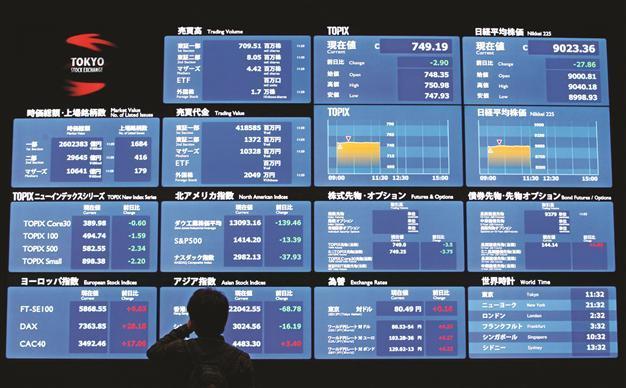Seismic fears drop Japan power
TOKYO - Agence France-Presse

A visitor looks at a screen displayed market indices from around the world and foreign currency rates against the Japanese yen at the Japanese Stock. REUTERS photo
Shares in Japanese power companies dropped yesterday after a panel of experts said one of the nation’s nuclear plants may sit over an active seismic fault, raising fears it would have to be scrapped.Experts tasked by the Nuclear Regulation Authority (NRA) with investigating the tectonic situation under the Tsuruga plant in central Fukui prefecture said Dec. 10 that it showed signs of geologically recent movement.
“Active” faults are those that, amongst other things, have moved within the past 120,000-130,000 years. Under government guidelines atomic installations cannot be sited on a fault if it is still classed as active.
If the regulator formally decides that the Tsuruga plant, which houses two reactors on the Sea of Japan (East Sea) coast, is sitting above active faults, it is likely to be decommissioned.The news sent Kansai Electric Power, which supplies power across western Japan, tumbling 4.38 percent to end at 742 yen, while Chubu Electric Power fell 4.05 percent to 1,041 yen.
Tokyo Electric Power, operator of the crippled Fukushima Daiichi plant that was at the centre of Japan’s atomic crisis last year, eased 1.42 percent to 138 yen.
All but two of Japan’s 50 nuclear reactors remain offline after they were shuttered for regular safety checks in the aftermath of the 2011 crisis at Fukushima, when a huge tsunami generated by an earthquake caused meltdowns.
The NRA is also set to conduct inspections at five other plants to see if they sit on active faults, including the Oi nuclear facility, Japan’s only working atomic power plant. Hundreds of thousands of people were made homeless by the Fukushima accident and tracts of prime agricultural land were left unfarmable. Anti-nuclear sentiment is running high in Japan, which used to rely on the technology for around a third of its electricity needs.
















